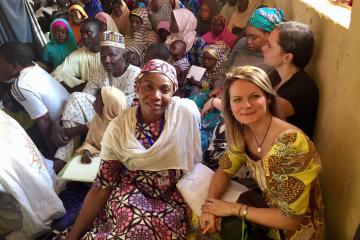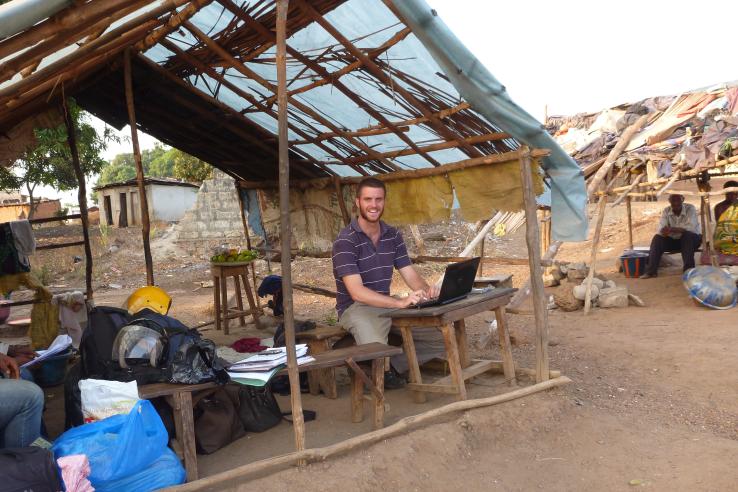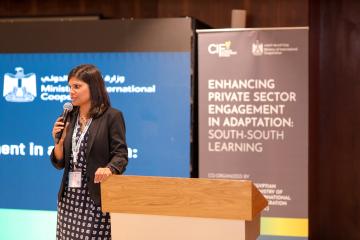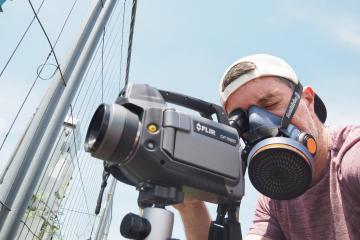
Grant Bridgman, J-PAL '14, on breaking down language barriers in Africa and Asia

The Alumni Spotlight series highlights J-PAL alumni who are making an impact across industries and around the world. Formerly a research analyst at J-PAL Africa, Grant Bridgman '14 now leads Uliza, a translation start-up that aims to improve access to information across hundreds of languages. He describes his journey from J-PAL to Uliza in this post in our Alumni Spotlight series. You can reach out to him at [email protected].
Time at J-PAL
What first inspired you to build a career in the development and public policy space?
I grew up in South Africa, and, after I went through an initial game ranger phase, I became very aware of the breadth of lived experiences in our country, and the justice issues we face. Our family grew up talking about these things around the table a lot. My father is a lawyer and my mother has a doctorate in political science. Joining their conversations is what first inspired my interest in development and public policy.
How did you first hear about or come across J-PAL?
I heard about J-PAL in 2010 when they began setting up an office at the University of Cape Town, where I was doing my undergraduate degree in philosophy, politics, and economics. Two J-PAL/IPA staff, Martin Abel and Luke Crowley, were scouting for RA candidates in my econ classes, and they approached me to ask if I’d be interested in applying. I liked them, and I was interested. Our classes didn’t cover much about RCTs back then, and before my interview with Rachel Glennerster, Luke took it upon himself to coach me on the dangers of sampling bias and poor counterfactuals. It went well, and before I knew it I was in the IPA office in Sierra Leone.
Could you describe your day-to-day work at J-PAL Africa as a research assistant?
Working in the Freetown office was my first real job after undergrad. When I arrived in January 2011, it was a newly established and small office. There was a frontier atmosphere in the team, from the excitement of the work and from the types of challenges that we needed to troubleshoot in our day-to-day, like not having electricity, connectivity, and having to pay survey teams with duffle bags of cash. The biggest bank note was equivalent to a $2 bill. I was at an age where I had zero responsibilities outside of work, and I threw myself into it. I absolutely loved it.
What aspect of the job did you value most?
On my first day in Sierra Leone, our country director threw me straight onto public transport, at 6am. I went out of town to a village market to join one of my PIs, Tristan Reed, who was piloting a survey for rice traders with the help of Fatoma Momoh, a field coordinator who would become my close colleague and friend. He is still with IPA, now as an RA. We walked through the market taking notes and speaking with traders with the help of Fatoma. There was one moment in particular on that day that stands out, and that illustrates one of the things I valued most about my day-to-day work as an RA. We had an impromptu formal meeting with one of the main local traders under a mango tree. As the trader spoke and Fatoma interpreted, I could not believe my good fortune at being where I was—getting to sit right across from a person I would really like my career to benefit, hearing them speak about what mattered to them. I valued the many similar moments of insight into the lives of people that I was given while at J-PAL.
The path to Uliza
You’ve spent the last several years founding and leading Uliza, a translation and communications service for businesses that specializes in African and Asian language. Can you tell us more about Uliza’s mission and what you do?
Our mission at Uliza is equal access to knowledge. Our focus is on the barrier of language. We do this using tech-enabled translation in about 300 languages and through our Conversation Sheets product, where our clients design automated IVR phone call surveys (interactive voice response) and guided WhatsApp conversations from a spreadsheet.
In the background, we’re also involved in developing AI in low-resource languages (languages that are not well represented on the internet), and we manage a network of about 1,700 professional translators.
What motivated you to pursue this specific path? How does your time at J-PAL inform your work with Uliza?
The motivation to get on this specific path at Uliza came to me in an unexpected moment on our porch in Sierra Leone, when I was an RA in 2011. Our porch in Freetown had a great view and was good for thinking. I had been troubleshooting a coding problem with the help of the internet. Suddenly I became aware of my friend, Ibrahimovic, who lived in a pan body house next door and was probably on his phone. He was unemployed. I realized that while I was working, I was connecting to the same cell phone tower as him, and that our data packets were probably going to the tower side-by-side. I became aware of the yawning gap in utility that I was getting from the cell phone tower compared to Ibrahimovic, even though in theory we had access to the same internet. There are, of course, many reasons for the difference, but I was struck by how intractable the issue of language was. Ibrahimovic was not confident in English. If you are confident in critical inquiry in English or a similarly privileged language you have almost all of the world’s knowledge accessible to you, and if you are not then you just don’t. The structural and deeply entrenched inequality in access to knowledge dawned on me. At the time I felt like it may not even be solvable.
It was from there that I started thinking about how to build a career in giving people access to whatever critical knowledge they wanted in their language, and ideally by voice.
What are some of the challenges you've faced in scaling Uliza's impact, and how have you addressed them?
When we began in 2016 we wanted to be a bit like Google over voice phone calls in African languages. Uliza means “Ask” in Swahili. In our first iteration of this service we had fantastic take up, the questions and answers were amazing, but we couldn’t figure out how to make it pay for itself. We couldn’t find the type of customer who both valued the service and who could also pay for it to run. That was in large part because in 2011 the service relied heavily on crowdsourcing people to find answers to Swahili questions. It needed to be cheaper. Now that it’s 2024, there are some fresh opportunities for us to explore in this space using large language models (LLMs) and WhatsApp, which may be able to lower the cost enough, but it is still very much R&D.
Our main solution has been to adjust the business model so that the value we create is better matched to a willing buyer. We decided to look for organizations that are already trying to scale up their work in low-resource languages, and help them do that. That has worked for us.
Looking to the future
How do you see technology, particularly AI and machine learning, shaping the future of development programs (or business in general) in Africa?
I think AI is how we’ll be able to make critical knowledge and services available to most people in low-income countries. Without it, we just don’t have enough doctors, agronomists, teachers, lawyers, translators, and financial advisors to help everyone, and their fair market wages make their services just too costly for comprehensive cover in low-income countries, let alone for low-income people in wealthy countries.
However, I see a very big role for experts in AI deployment, human experts—particularly when deploying a service in low-resource languages and for marginalized people who are not well represented in the AI training data. At Uliza I see our biggest contribution in the rollout of AI as being deployment managers, offering a way for organizations to ensure some level of quality when they are offering AI in low-resource languages. I expect this to become a need that continues to grow.
In what ways do you think organizations like J-PAL and Uliza can collaborate to advance development outcomes?
Research organizations like J-PAL are valuable testing grounds for the ideas that Uliza and similar organizations want to implement. I read J-PAL’s research updates keenly hoping to see new projects that will give us clues about whether we’re on the right track, and about how to deliver knowledge in ways that work.
There are a lot of things I’d like to test with researchers. I’d like to know more about the mechanisms behind effective knowledge transfers for specific audiences and areas of knowledge. We’re interested in tutoring for high school students, assistance for ECD teachers, maternal healthcare, and information for farmers. If a researcher wanted to test an information treatment through Uliza, I’d love that.
Open-sourcing text and audio data is another area for collaboration. If any J-PAL projects have text that has been translated, from survey data or the questionnaires themselves, or voice recordings that have been transcribed, please open-source them and publish them on the internet. Those are valuable resources for AI developers in low-resource languages, where data is scarce. If anyone needs help figuring out how to do that, I would be happy to talk.
Another clear way to collaborate is by making surveys cheaper and quicker to deploy. That’s what we want our Conversation Sheets product to do, through IVR phone calls and guided WhatsApp conversations in local languages.


